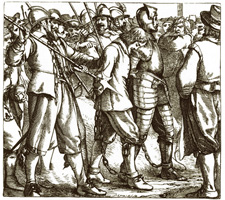There, therefore, they lay for some time, and were made the objects of any man’s sport, or malice, or revenge, the great one of the fair laughing still at all that befell them. But the men being patient, and not rendering railing for railing, but contrariwise, blessing, and good words for bad, and kindness for injuries done, some men in the fair that were more observing, and less prejudiced than the rest, began to check and blame the baser sort for their continual abuses done by them to the men. They, therefore, in angry manner, let fly at them again, counting them as bad as the men in the cage, and telling them that they seemed confederates, and should be made partakers of their misfortunes. The other replied that, for aught they could see, the men were quiet, and sober, and intended nobody any harm; and that there were many that traded in their fair that were more worthy to be put into the cage, yea, and pillory too, than were the men they had abused. Thus, after diverse words had passed on both sides, the men behaving themselves all the while very wisely and soberly before them, they fell to some blows among themselves, and did harm one to another. Then were these two poor men brought before their examiners again, and there charged as being guilty of the late hubbub that had been in the fair. So they beat them pitifully, and hanged irons upon them, and led them in chains up and down the fair, for an example and a terror to others, lest any should speak in their behalf, or join themselves unto them. But Christian and Faithful behaved themselves yet more wisely, and received the ignominy and shame that was cast upon them, with so much meekness and patience, that it won to their side, though but few in comparison of the rest, several of the men in the fair. This put the other party yet into greater rage, insomuch that they concluded the death of these two men. Wherefore they threatened, that the cage nor irons should serve their turn, but that they should die, for the abuse they had done, and for deluding the men of the fair.
Then were they remanded to the cage again, until further order should be taken with them. So they put them in, and made their feet fast in the stocks.
Here, therefore, they called again to mind what they had heard from their faithful friend Evangelist, and were the more confirmed in their way and sufferings by what he told them would happen to them. They also now comforted each other, that whose lot it was to suffer, even he should have the best of it. Therefore each man secretly wished that he might have that preferment: but committing themselves to the all-wise disposal of Him that rules all things, with much content, they abode in the condition in which they were, until they should be otherwise disposed of.
 In the last post Christian and Faithful faced the ire of the town of Vanity by being beaten and imprisoned. They resisted the town’s temptations and suffered the ensuing persecution. Their hardship was not to be brief. “They lay for some time” in their bonds facing the ridicule and antagonism of the world. They suffered long—and the longer they suffered, the worse their circumstances seemed to get.
In the last post Christian and Faithful faced the ire of the town of Vanity by being beaten and imprisoned. They resisted the town’s temptations and suffered the ensuing persecution. Their hardship was not to be brief. “They lay for some time” in their bonds facing the ridicule and antagonism of the world. They suffered long—and the longer they suffered, the worse their circumstances seemed to get.
Bunyan describes in the story a variety of reactions and responses from the people at the fair. Some are amused at the pilgrims, others are angry. Some dish out ridicule and scorn; others seek their harm. Still others are sympathetic and become upset with those who are giving out abuse. The abusers then react more violently still. But regardless of the response, favorable or not, Christian and Faithful act wisely. By God’s grace they endure with patience, even when falsely accused and more severely abused.
There are many brothers and sisters in Christ around the world who face severe persecution and hardship because of their faith. Remember to pray for them. Pray for their endurance—that they would be humble and wise—that God would strengthen their faith. Pray for their witness—that they would honor Christ—that God would magnify their testimony to all who see them and hear of them. And pray for their captors—that God would stir in their hearts curiosity and compassion—that God would save them. Thankfully there are organizations like Voice of the Martyrs that remind us of brothers and sisters in chains. Pray diligently for the persecuted church.
In the face of persecution Christian and Faithful return blessing for railing and kindness for injury. They are “quiet” and “sober” and do not speak out against those who seek their demise. By enduring suffering with meekness, wisdom and patience, the two pilgrims are examples of Christ. Isaiah prophesied of Jesus’ suffering:
He was oppressed and He was afflicted,
Yet He opened not His mouth;
He was led as a lamb to the slaughter,
And as a sheep before its shearers is silent,
So He opened not His mouth.
He was taken from prison and from judgment,
And who will declare His generation?
For He was cut off from the land of the living;
For the transgressions of My people He was stricken.
And they made His grave with the wicked—
But with the rich at His death,
Because He had done no violence,
Nor was any deceit in His mouth.
(Isaiah 53:7–9)
Jesus suffered for us and we are to follow His example. Peter quotes from Isaiah 53 as he exhorts us:
Servants, be submissive to your masters with all fear, not only to the good and gentle, but also to the harsh. For this is commendable, if because of conscience toward God one endures grief, suffering wrongfully. For what credit is it if, when you are beaten for your faults, you take it patiently? But when you do good and suffer, if you take it patiently, this is commendable before God. For to this you were called, because Christ also suffered for us, leaving us an example, that you should follow His steps: “Who committed no sin, nor was deceit found in His mouth”; who, when He was reviled, did not revile in return; when He suffered, He did not threaten, but committed Himself to Him who judges righteously; who Himself bore our sins in His own body on the tree, that we, having died to sins, might live for righteousness—by whose stripes you were healed. For you were like sheep going astray, but have now returned to the Shepherd and Overseer of your souls (1 Peter 2:18–25).
As Christian and Faithful endure persecution, they trust that God is in control. They remember that suffering is a promised part of their pilgrimage. Evangelist had told them plainly that they would suffer for the sake of Christ. And so they comfort one another, knowing that the “worst” that could be done to them in this life (being put to death) is actually the “best” (because the one who suffers death will sooner be in the Lord’s presence). As Paul confesses: “For to me, to live is Christ, and to die is gain” (Philippians 1:21).
God is working all things together for their good and His glory—even pain and suffering. Just as God did with the cross—taking an evil act (crucifying the Son of the God) and bringing about great good (the salvation of sinners)—He uses the persecution and suffering of His people to accomplish good, strengthening our faith and testimony before a watching world. The testimony of Christian and Faithful is confirmed and strengthened in the crucible of persecution and suffering.
Bunyan contemplated his own suffering and possible death while in prison. He desired to endure and be faithful. He writes in his autobiography:
Before I came to prison, I saw what was a-coming, and had especially two considerations warm upon my heart; the first was how to be able to endure, should my imprisonment be long and tedious; the second was how to be able to encounter death, should that be here my portion; for the first of these, that Scripture (Colossians 1:11) was great information to me, namely, to pray to God to be “strengthened with all might, according to his glorious power, unto all patience and long-suffering with joyfulness.” I could seldom go to prayer before I was imprisoned, but not for so little as a year together, this sentence, or sweet petition, would, as it were, thrust itself into my mind, and persuade me, that if ever I would go through long-suffering, I must have all patience, especially if I would endure it joyfully [Grace Abounding to the Chief of Sinners, par. 324].
Bunyan did indeed learn patience. His faith in God was strengthened and his trust in God’s good purposes was affirmed.
In Bunyan’s account of his imprisonment, he closes it with these words—“Thus have I, in short, declared the manner and occasion of my being in prison; where I lie waiting the good will of God to do with me as He pleaseth; knowing that not one hair of my head can fall to the ground without the will of my Father which is in Heaven. Let the rage and malice of men be ever so great, they can do no more, nor go any further, than God permits them. When they have done their worst, “we know that all things work together for good to them that love God” (Rom. 8:28) [From Relation of Bunyan’s Imprisonment in The Works of John Bunyan (Banner of Truth) 1:54].
A Guide to John Bunyan’s The Pilgrim’s Progress
See TOC for more posts from this commentary
The text for The Pilgrim’s Progress and images used are public domain
Notes and Commentary ©2016 Ken Puls
Unless otherwise indicated, all Scripture quotations are from the New King James Version (NKJV) ©1982 by Thomas Nelson, Inc.


